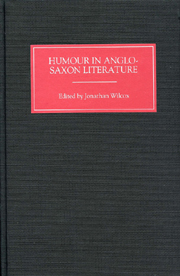Book contents
- Frontmatter
- Contents
- Contributors
- Acknowledgements
- Introduction
- Byrhtnoth's Laughter and the Poetics of Gesture
- ‘Grim Wordplay’: Folly and Wisdom in Anglo-Saxon Humor
- Humor, Wordplay, and Semantic Resonance in Beowulf
- Heroic Humor in Beowulf
- Humor in Hiding: Laughter Between the Sheets in the Exeter Book Riddles
- Sexual Humor and Fettered Desire in Exeter Book Riddle 12
- ‘Why do you speak so much foolishness?’ Gender, Humor, and Discourse in Ælfric's Lives of Saints
- A Funny Thing Happened on the Way to Heaven: Humorous Incongruity in Old English Saints' Lives
- Index
Byrhtnoth's Laughter and the Poetics of Gesture
Published online by Cambridge University Press: 12 September 2012
- Frontmatter
- Contents
- Contributors
- Acknowledgements
- Introduction
- Byrhtnoth's Laughter and the Poetics of Gesture
- ‘Grim Wordplay’: Folly and Wisdom in Anglo-Saxon Humor
- Humor, Wordplay, and Semantic Resonance in Beowulf
- Heroic Humor in Beowulf
- Humor in Hiding: Laughter Between the Sheets in the Exeter Book Riddles
- Sexual Humor and Fettered Desire in Exeter Book Riddle 12
- ‘Why do you speak so much foolishness?’ Gender, Humor, and Discourse in Ælfric's Lives of Saints
- A Funny Thing Happened on the Way to Heaven: Humorous Incongruity in Old English Saints' Lives
- Index
Summary
If the past is a foreign country, then those who seek it out take on the role of explorers in a half-known realm. We may approach that realm with the maps and compasses that previous explorers have devised and have bequeathed us, but we will do well to keep in mind that Greenwich meridian longitude may have no meaning to the people dwelling there. Those people may reckon the months by the position of the stars; they may count distances in terms of days on the road and may draw their own maps in the dust; they may measure land in terms of human need, not geometric acreage. Regardless of its familiarity, which paradoxically may diminish as our knowledge of it grows, any era of the past is best approached as an anthropologist might approach unfamiliar shores.
There is nothing new about the problem of how to shed, as far as can be done, the conceptual biases of our own time and place so as to be able to penetrate the mental world of those people from other times and places whose culture we hope to understand. Consciousness of that problem does little to diminish it, however. Any small question in literary interpretation – how to interpret the scene in which Byrhtnoth laughs out loud in The Battle of Maldon, for example – can soon take on the knottiness of a problem in cognitive anthropology or ethnopsychology.
- Type
- Chapter
- Information
- Humour in Anglo-Saxon Literature , pp. 11 - 32Publisher: Boydell & BrewerPrint publication year: 2000



